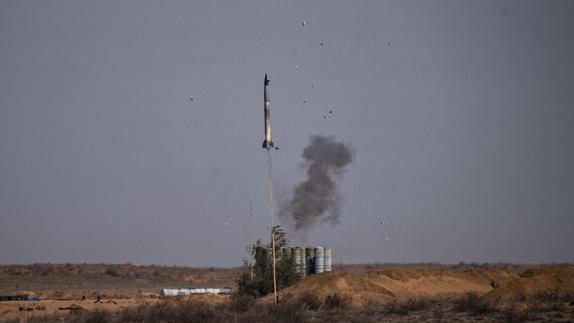 In this Sept 22, 2020 photo, a rocket launches from a S-400 missile system at the Ashuluk military base in Southern Russia. (Dimitar DILKOFF / AFP)
In this Sept 22, 2020 photo, a rocket launches from a S-400 missile system at the Ashuluk military base in Southern Russia. (Dimitar DILKOFF / AFP)
Turkey is considering bolstering its Russian-supplied missile defense system with additional purchases in the face of US opposition, the chief of the country's defense industries agency said on Wednesday.
The United States in December imposed sanctions on fellow NATO member Turkey over its initial purchase of the S-400 surface-to-air missile system.
Turkey has not felt any consequences from the US sanctions imposed over the purchase of the missile system, Ismail Demir, the president of Turkey's Defense Industry Directorate, said in an interview with the Turkish NTV television channel.
"Our work on the second (round) of the S-400 system continues," he said, adding that Turkey is also working on reinforcing its armed forces by developing its own air defense systems.
"This year, the deliveries of Sungur and Hisar A+ air defense systems will begin and the work on developing the domestic Siper air defense system continues."
As Turkey weighs its options, Demir said the S-400 system already delivered to Turkey was ready for activation.
Demir's remarks come within a month of US State Department spokesperson Ned Price reiterating the country's opposition to Turkey's possession of the Russian-made air defense system.
In 2017, Turkey and Russia signed a US$2.5 billion deal on the delivery of the S-400 missile system to Ankara. The deal also envisages partial transfer of production technology to Turkey.
The agreement made Turkey the first member of the trans-Atlantic security alliance to buy an air defense system from Russia.
ALSO READ: Turkey says turning back on S-400s 'problematic', seeks US dialogue
They threaten the security of NATO technology and they are inconsistent with Turkey's commitments as a NATO ally.
Ned Price, US State Department spokesperson
Profound concerns
"We have and we continue to urge Turkey not to retain this system," Price said last month. "We have very profound concerns about the S-400 system and the S-400 system in the context of a NATO ally.
"They threaten the security of NATO technology and they are inconsistent with Turkey's commitments as a NATO ally."
In the sanctions announced on Dec 14, the US imposed restrictions on the leadership of Turkey's Defense Industry Directorate, including Demir and three other Turks under the Countering America's Adversaries Through Sanctions Act, or CAATSA, in response to the S-400 purchase.
"We have not noticed any direct effect from the US sanctions," Demir said. "Turkey will see the fallout from the US applying the CAATSA, but at present there are no clear consequences."
Demir called the US position to Ankara's S-400 purchase incorrect. "If they think that this will dissuade us from any our national decision, then they are incorrect," he said.
Of Turkey's position on buying the F-35, a next-generation fighter jet from the US, he said the country is not seeking it "at any cost".
Turkey was excluded from the US'F-35 program after it purchased the Russian missile defense system. The country hired US law firm Arnold&Porter to represent its interests in Washington in February.
Demir claimed Turkey's move to hire the law firm did not signal an effort to reenter the F-35 program but to seek compensation.
READ MORE: Erdogan says Turkey tested Russian S-400s, shrugs off US objections
Contact the writer at renqi@chinadaily.com.cn


